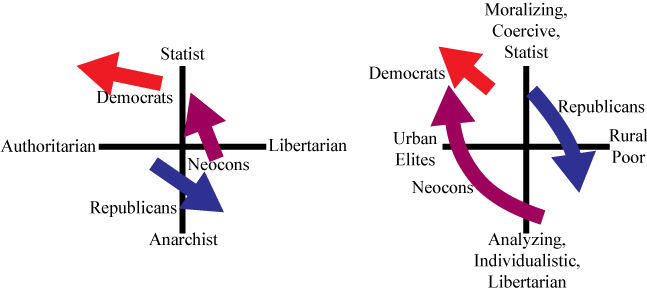 here are the political dividing lines in America today? We're so accustomed to seeing
the world in terms of left vs right that we're in danger of misunderstanding
them. The old vision of two static worldviews is no longer valid; we need to
look at trajectories.
here are the political dividing lines in America today? We're so accustomed to seeing
the world in terms of left vs right that we're in danger of misunderstanding
them. The old vision of two static worldviews is no longer valid; we need to
look at trajectories.
The election of Donald Trump has revealed the existence of a sharp dividing line between the elites and the people. This line has always existed in America, as rich urban vs poor rural. The rich urbanites look down on the rurals, calling them names we're all familiar with, but at the same time they romanticize nature and the wilderness. To rurals, trees are things that tip over at the most inconvenient time. They have always despised the rich, calling them snobs.
We can observe how American society is fragmented by looking not at abstract ideological differences but by noting who hates whom. Hatred is how people try to control each other's behavior. No one likes being hated; group hatred has always led to tribal conflict. Perhaps it was evolution that taught us that someone who hates us will sooner or later try to kill us, and so we automatically return the hatred. Sometimes the hate slips out: “vicious demagogue.” Poor rural communities “deserve to die.” “Basket of deplorables.”
Admittedly much of this is political theater. If your politics are based on the herd instinct, and you think feelings have probative value, then the sight of people rioting and F-bombing might convince you that the rioters genuinely feel angry, and therefore their cause has some validity.

This shows that political views are not static. They change as tactics evolve, and to accommodate the specific things people want.
Another dividing line distinguishes left and right more cleanly: those who adopt a moralizing stance against their opponents and those who see different points of view as natural phenomena whose origins and motivations need to be understood.
I don't have to tell you which groups are taking a moralizing stance. They are today's haters: the Nancy Pelosis, whose hateful facial expressions during Trump's speech will be forever recorded in history. The Hillarys and the race baiters, who forever view their opponents through the hate-colored glasses of identity politics. The Snowflake brigades and the SJWs.
What may be surprising is now much they now have in common with the neocons, the Bushes, and the remnants of movement conservatism, all of whom are unrepentant opponents of Trump. Whether they recognize it yet or not, Neocons share many beliefs with Hillary.
One could even say that today's division is not so much between individualists and statists as between the entrepreneurs and the confiscators.
To understand what's changing, we have to look at politics not as sets of static beliefs, but as trajectories that people follow from one set to another. Using the old criteria (authoritarian vs libertarian, statist vs anarchist), the changes have been small: Democrats became a little more authoritarian, Neocons a little more statist. But by the new criteria the changes are big: Neocons and movement conservatives became much more urban and more statist, while the Republican base became a lot less moralizing and more rural.
Despite the Neocons' stated distaste for PC, the political distance between the Dems and Neocons is decreasing. Both are statist, though they have different views of how state power should be used.
The Republican base has moved from the upper right, the realm of the old-style rural moralistic preachers, to somewhere near the lower right: more rural and less statist. The Republican base is more Pat Buchanany now, and the Neocons are becoming Hillaryistic.
Last edited Mar 04, 2017, 8:42 am
